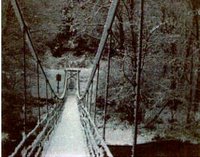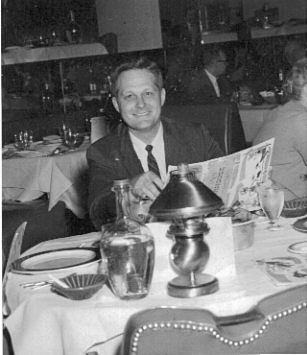
When I left my job, my career, and my identity, the love of my life decided it was time for a balloon ride. So that's what he gave me for my birthday that year--a ride in a hot-air balloon. What a way to celebrate.
I thought it would be exciting, but it was one of the most peaceful things I've ever done. Since you travel the same speed as the wind and the blast of hot air is only occasional, the silence up in a balloon can be profound. That day, the tourists who had also plopped down the big bucks for their time in the sky couldn't make it, so there were just 5 in the basket: the pilot, the two of us, and two guys who had grown up in that same valley--a father and his grown son.
There wasn't much wind that day either, so we didn't go far. Instead, we travelled in time as we brushed the treetops, with the old father telling stories of who used to own that land over there, and how that barn there was the most modern thing going when it was built in 1955. Now that developers have gotten interested in that whole beautiful valley, his family's deep connection to the land will soon be stripped away.
When we landed on the roadside it was church time, but I didn't see how being in church could make me feel any closer to God than brushing the treetops and listening to stories about the soil.
With my father's mental illness, talking to him was like going up with a balloon, but that was a whole different thing. More like holding onto the single string of a helium balloon, holding on for all you were worth.
You'd start with both feet on the ground. He'd be easy and friendly with you, asking about something he knew you were interested in. Depending on the time in my life, it would be Shakespeare, or literacy, or the YWCA, or whatever. He somehow knew enough about where I was to have a good solid starting point. I'd think we were going to talk about me for a change. Or at least places that our interests connected.
But then would come the gradual lift-off, so gentle you wouldn't usually notice until your feet were about 5 feet off the ground. At that point it felt rude to let go, so you'd hang on. It's just a conversation, you'd think--what could be the harm? Then that deep-south drawl would take you up and up, higher and higher, until the ground looked too far away for a safe jump. At that point you held on because you had to. And here you were, up in the ether with him. How did we get from Shakespeare to the ancient rituals of the Chaldeans, and how they could save our world if people would only listen? Then the question would become a little scarier: am I crazy, too, now that I'm up here with him?
And that question, that very question, was the one that haunted me throughout my childhood, adolescence, and beyond:
Am I crazy, too?
It was a fear way beyond any of the others.
Now that I'm almost 40, I think I have the answer. And some peace.



























